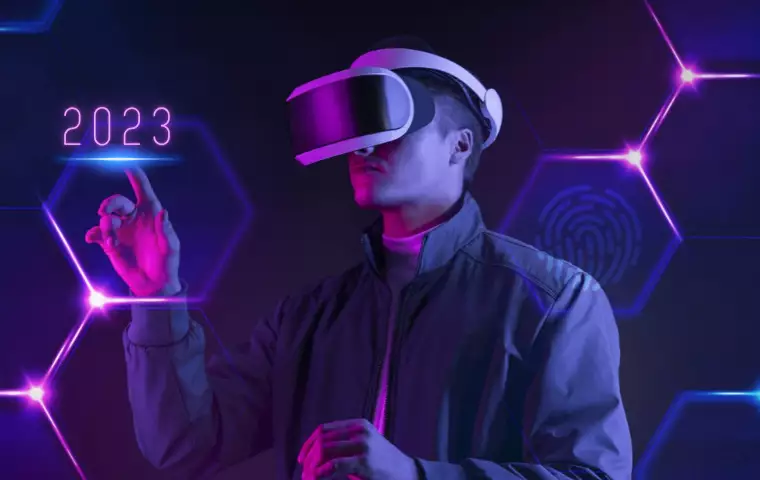The New Era of AI in 2025: From Gemini 3 to Creative AIs
Learn about the best AI tools for 2025, including Nano...
We use cookies for our website to give you the most relevant experience by remembering your preferences. By clicking “accept”, you consent to use of ALL the cookies
This website uses cookies to improve your experience while you navigate through the website. Out of these, the cookies that are categorized as necessary are stored on your browser as they are essential for the working of basic functionalities of the website. We also use third-party cookies that help us analyze and understand how you use this website. These cookies will be stored in your browser only with your consent. You also have the option to opt-out of these cookies. But opting out of some of these cookies may affect your browsing experience.
Necessary cookies are absolutely essential for the website to function properly. These cookies ensure basic functionalities and security features of the website, anonymously.
| Cookie | Duration | Description |
|---|---|---|
| cookielawinfo-checkbox-functional | 11 months | This cookie is set by GDPR Cookie Consent plugin. The cookie is used to store the user consent for the cookies in the category “Analytics”. |
| cookielawinfo-checkbox-functional | 11 months | The cookie is set by GDPR cookie consent to record the user consent for the cookies in the category “Functional”. |
| cookielawinfo-checkbox-necessary | 11 months | This cookie is set by GDPR Cookie Consent plugin. The cookies is used to store the user consent for the cookies in the category “Necessary”. |
| cookielawinfo-checkbox-others | 11 months | This cookie is set by GDPR Cookie Consent plugin. The cookie is used to store the user consent for the cookies in the category “Other. |
| cookielawinfo-checkbox-performance | 11 months | This cookie is set by GDPR Cookie Consent plugin. The cookie is used to store the user consent for the cookies in the category “Performance”. |
| viewed_cookie_policy | 11 months | The cookie is set by the GDPR Cookie Consent plugin and is used to store whether or not user has consented to the use of cookies. It does not store any personal data. |
Functional cookies help to perform certain functionalities like sharing the content of the website on social media platforms, collect feedbacks, and other third-party features.
Performance cookies are used to understand and analyze the key performance indexes of the website which helps in delivering a better user experience for the visitors.
Analytical cookies are used to understand how visitors interact with the website. These cookies help provide information on metrics the number of visitors, bounce rate, traffic source, etc.
Advertisement cookies are used to provide visitors with relevant ads and marketing campaigns. These cookies track visitors across websites and collect information to provide customized ads.
Other uncategorized cookies are those that are being analyzed and have not been classified into a category as yet.
Cyberia Tech, Inc. respects your privacy. This Privacy Policy explains how we collect, use, and share your information. By using our services, you agree to this policy. If any other agreements conflict with this Privacy Policy, the terms of those agreements prevail.
Cyberia Tech complies with the EU-US and Swiss-US Privacy Shield Frameworks for handling personal data from the EEA, UK, and Switzerland. In case of any conflict, the Privacy Shield Principles prevail. Learn more at Privacy Shield. Key Definitions
Information linked to an individual, transferred from the EEA, UK, or Switzerland to the U.S.
Data revealing race, religion, health, sexual orientation, and similar categories.
Effective Date: [ 2026 / 03 / 05 ]
Welcome to The Cyberia Tech ! By accessing or using our website or services, you agree to
comply with and be bound by these Terms of Use and our Privacy Policy. If you do not agree with
these terms, please do not use our Services.
Loading
0 %

Predicting a list of tech trends for 2023 is highly challenging due to the rapid pace of the advancement of emerging technologies. Significant advances in several fields are being made almost daily. Here are five emerging technologies that are going to alter our life drastically.
Table of Contents

AI will be a godsend for the cybersecurity industry. Data breaches are an ongoing issue, but AI will solve some of the most significant challenges now confronting cybersecurity professionals.
AI revolves around automation, and machine learning plays a vital role in achieving this objective. The ability for machines to observe and learn from our behavior is a fascinating technological development. With this capability, devices can gain insights into human behavior and use that knowledge to improve their performance and interactions with us. It opens up a world of possibilities for creating more intuitive and personalized experiences with technology.
In today’s world, computer technologies have advanced to a level where they can detect patterns in hacker attacks. This has enabled them to provide predictive analysis for breaches before they occur, which is a significant step towards ensuring the security of our digital systems. With these advancements, we can now stay ahead of cybercriminals and protect our sensitive information from being compromised.
The concept of artificial intelligence is not a new or exclusive one.
AI research has been a prominent field of study for over six decades, and numerous major corporations have already integrated it into their daily operations. Artificial Intelligence (AI) remains challenging to master, making its development costly.
As we look ahead to 2022, one of the most pressing challenges we face is making technology accessible and affordable for everyone. This will require innovative solutions and a concerted effort from industry leaders, policymakers, and consumers alike. Without widespread access to technology, we risk leaving behind those who are already marginalized and exacerbating existing inequalities.
It’s up to all of us to work together to ensure that the benefits of technology are available to all, regardless of their socioeconomic status.
The Internet of Things (IoT) is a technology that has existed for quite some time now, but its full potential is yet to be realized.
Picture this: you’re going to deliver a presentation to your entire department when you are trapped in a seemingly endless traffic jam.
In today’s fast-paced world, it’s easy to get caught up in the stress and chaos of everyday life. However, it’s important to remember that there’s nothing to worry about sometimes.
In today’s world, staying connected to work is more important than ever. Fortunately, technological advancements have made it easier to keep on top of your tasks, even when you’re on the go.
One such innovation is the ability for your phone to detect delays and send critical information directly to your work computer. This means you can stay productive and efficient no matter where you are without missing a beat. With these new technologies at your fingertips, you’ll never have to worry about falling behind again.
In today’s work environment, scheduling conflicts can arise at any moment. Fortunately, tools are available to help us manage our time more efficiently.
The capabilities of IoT may seem like something straight out of a science fiction movie. However, the reality is that IoT has the potential to achieve even more than what we can imagine.
According to a 2021 Bloomberg analysis in 2021, the metaverse market is projected to reach an impressive $800 billion by 2024.
The Metaverse is a cutting-edge 3D virtual simulation that offers a unique opportunity for individuals to engage with each other through various platforms.
With the advent of Internet 3.0, advertisers are set to explore the vast marketing potential of this immersive experience. This will make it an ideal platform for creating brand awareness and driving user engagement.
Nikeland and other leading brands are utilizing advanced technologies like AI and VR to track consumer behavior and preferences within their Metaverse stores. These cutting-edge experiences provide valuable insights into consumption patterns, allowing brands to optimize their marketing strategies and enhance the overall customer experience.
Businesses are increasingly looking to improve user experience by integrating their brick-and-mortar stores with the metaverse through the use of QR codes.
As we look ahead to the future of technology, it’s essential to consider the trends that will shape the landscape in the coming years.
One such trend that cannot be overlooked is the Digital Immune System (DIS). This innovative technology promises to revolutionize how we approach cybersecurity and protect our digital assets.
Without a doubt, any discussion of tech trends for 2023 would be complete by mentioning the DIS and its potential impact on the industry.
The concept of “this system” encompasses a comprehensive framework of methodologies that have been adapted from various fields, such as software design, automation, development, operations, and analytics. In today’s competitive business landscape, mitigating risks is crucial for success. One way to achieve this is by neutralizing defects, threats, and system vulnerabilities. Businesses can enhance the overall customer experience and build trust with their audience. I
It’s essential to prioritize risk management to stay ahead of potential issues and ensure the longevity of your business. In today’s digital age, safeguarding software systems from virtual threats is paramount. This is where DIS comes into play.
DIS, or Defense in Depth, is a technique that involves automating various elements of a software system to ensure its protection against all kinds of virtual threats. By implementing DIS, organizations can rest assured that their software systems are secure and well-protected.
According to predictions, companies that are currently implementing DIS (Digital Immune Systems) will be able to reduce customer downtime by approximately 80% by the year 2025.

The integration of healthcare and AI has been a solid and enduring partnership for several years now.
The tech industry has been instrumental in propelling us out of the dark ages, with its trends and investments in technology leading the way.
One of the most significant impacts has been eradicating diseases that have plagued humanity for centuries.
Although progress has been made, a considerable distance remains to cover.
Integrating AI-driven technologies in the drug delivery is set to revolutionize the pharmaceutical industry. This move by Big Pharma companies aims to enhance the interaction between clients and drug providers, ultimately leading to improved drug delivery.
Drug providers can optimize their processes with AI, resulting in more efficient and effective drug delivery. This exciting development promises to transform how drugs are delivered to patients in the near future.
In the near future, patients will have the opportunity to receive customized medical advice directly from specialists. This two-way communication will allow doctors to receive prompt feedback, resulting in a mutually beneficial relationship.
The healthcare industry is significantly impacted by various digital technology trends today.
Big data is becoming the unifying factor among all emerging technologies. The internet is currently filled with an enormous amount of data. Dealing with this issue could shape the future of humanity. The stakes are high, but we must remain level-headed and focused.
As we look ahead to 2022, it’s difficult to predict which technology trends will truly take off and make an immediate impact. Without a doubt, one thing remains certain:
In today’s world, there is a growing belief that technology holds the key to solving many of our problems. The optimism surrounding the potential of technology to be a game-changer is at an all-time high. Many people hope that technology will be the silver bullet to address the challenges we face in various fields.
Technologies that do not now exist but could in the near future. Studies of the assumptions, worldviews, and mythologies that inform the creation of hypothetical futures (also known as “futurology”).
Which technology is booming in future?
The finest technologies to invest in for 2023 include AI, Blockchain, Cloud Computing, Data Science, Virtual Reality, Cyber Security, etc.
How technology can change the world?
It has altered the way information is accessed. How we get fresh information has also been affected. These days, most individuals rely heavily on their electronic devices. We can always reach someone quickly and easily by sending a text message.
Toggle TitleWill technology affect the future?
There is much hope that technological progress will accelerate productivity and economic growth, as well as generate new and better employment opportunities. Some estimates place the contribution of new digital technologies to productivity growth in major economies over the next decade at as high as 66 percent.
You Can Get More Information!
